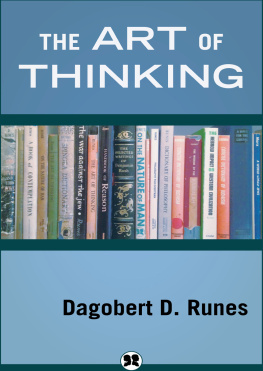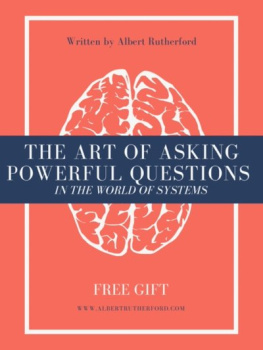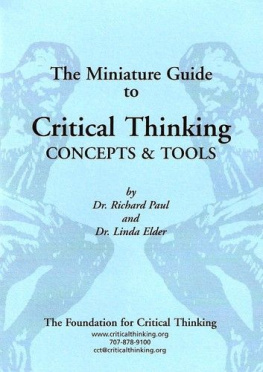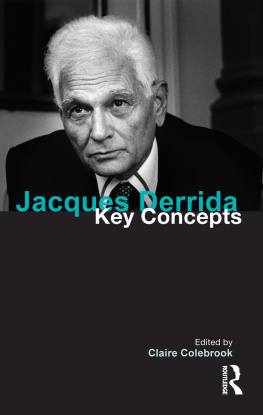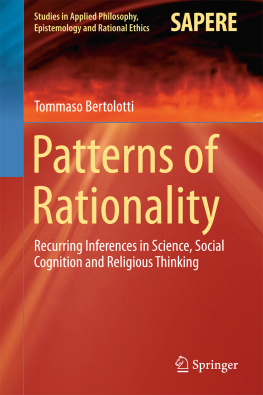Runes - The Art of Thinking
Here you can read online Runes - The Art of Thinking full text of the book (entire story) in english for free. Download pdf and epub, get meaning, cover and reviews about this ebook. City: Newburyport, year: 2015, publisher: Philosophical Library, genre: Art. Description of the work, (preface) as well as reviews are available. Best literature library LitArk.com created for fans of good reading and offers a wide selection of genres:
Romance novel
Science fiction
Adventure
Detective
Science
History
Home and family
Prose
Art
Politics
Computer
Non-fiction
Religion
Business
Children
Humor
Choose a favorite category and find really read worthwhile books. Enjoy immersion in the world of imagination, feel the emotions of the characters or learn something new for yourself, make an fascinating discovery.
- Book:The Art of Thinking
- Author:
- Publisher:Philosophical Library
- Genre:
- Year:2015
- City:Newburyport
- Rating:3 / 5
- Favourites:Add to favourites
- Your mark:
- 60
- 1
- 2
- 3
- 4
- 5
The Art of Thinking: summary, description and annotation
We offer to read an annotation, description, summary or preface (depends on what the author of the book "The Art of Thinking" wrote himself). If you haven't found the necessary information about the book — write in the comments, we will try to find it.
The Art of Thinking — read online for free the complete book (whole text) full work
Below is the text of the book, divided by pages. System saving the place of the last page read, allows you to conveniently read the book "The Art of Thinking" online for free, without having to search again every time where you left off. Put a bookmark, and you can go to the page where you finished reading at any time.
Font size:
Interval:
Bookmark:

The Art of Thinking
Dagobert D. Runes

CONTENTS
WISH AND VISION
People think alike. If they did not, they could not live alongside each other for a single day.
Were I to say I feel a draft, you would shut the window; were I to say the tea is cold, you would put the kettle back on the stove; were I to lunge at you with a long knife, you would fall back. It is self-evident that were we not to think alike, we would have to live in utter isolation. Thinking alike is the basis of human society and, to some extent, of animal society as well. As the saying goes, A hawk does not devour its own and a bee will not spit into the wax.
Whenever we find an un-alike form of thinking we are facing a sick or abnormal mind that may, as I have seen in mental institutions, try to cut bread with a spoon and eat soup with a fork. We may come back to the insane later in the book. At this point we are concerned with the mind of average mancontemporary, ancient, or primitive. All normal people think alike. If they should fail to do so for a single day they would share the fate of those who built the Tower of Babel.
The legend of Babel symbolizes the disaster befalling a community that differs in language. How much more calamitous if a community would differ in thinking!
I would like to assure the questioning reader that I fully recognize the alleged differences of thought besetting mankind. Such differences actually do not lie in the thinking process of man, but rather in what I call the emotional drive beneath, aside and above the logic of man.
Mans logic is like a set of sails. Whether they are set on schooners or junks, sloops or dinghies, sails they are. Big and small, white, red or black, fancy, sharp, and tightly woven, or sloppy, dank, ragged, fuzzy, or ripped, they will carry you through the sea of life. But it is the waves and the winds that make them go one way or another and sometimes push them over to an early end.
Some winds are hot and some are cold, zephyr and hurricane and the whole bountiful variety that lies between, including typhoons and icy storms and the dread stillness of the tropical doldrums.
It is the winds that blow the sails. It is the waves, mast high and canyon deep, caressing foam or stinging spray, or again, the hot stillness of palmy coaststhe seas also make the sails billow and pull or suddenly flutter into fainting spells.
The winds and the waves drive the sails. It is desire and the ego that drive mans reasoning.
Reason is never without the current of the ego and the wind of desire. No ship ever sailed the oceans without water and wind. No man ever went through life not borne and driven by the two classical passions of Self and the great Wish.
And that is why, suddenly, the people who think alike think so differently. It is the Babel of old times. They think in different emotions. Their egos are different and their affections are different. All mans thinking is motivated by these two great passions. Under their pressure, the masts are straining, and all around us in the sea of life we see the wrecks of once-proud ships, victims sometimes of their own greed and sometimes stranded on a neighbors stony self-interest.
The seven seas are full of shipwrecks gone to the bottom not because of the hazards that lie in the waterways, but rather because of mans disastrous inhumanity to man.
In years not so long gone inhabitants of rocky seashores sometimes fell to their knees on stormy days, praying to the Lord for a bountiful wreckage.
Then, as often now, the graveyard of some became a treasure ground for others. When the Romans, the clear-thinking Romans, leveled the walls of Carthage, Jerusalem, Athens, and Alexandria and a thousand other Greek and Semitic towns, they prayed to the gods to sanctify the loot dragged under the triumphal arches of Rome. Persons of good education still today travel thousands of miles so they may admire these pillars of Roman culture.
FAITH AND THE INFIDELS
There is one serious trouble with mans House of God: The believer hardly, if ever, takes the trouble of looking into the cellar to examine the foundations.
For the Christian, religion begins with Jesus; for the Moslem with Mohammed; for the Hebrew with Noahs covenant; and for the Hindu with one of the numerous demigods, depending upon which of the six sects claims his fealty.
But there were religions and there was faithand there was wonderment and despair, searching and affirming, before Jesus and before Moses, before Buddha and before Confucius; so if one wants to be master in his own house, one has to go down into the cellar and make a thorough job of it.
What we know of God we know from people, people speaking and people writing.
There is no other knowledge of God except by word of mouth and word of pen.
Religion is but a matter of scroll and parchment, and the reason why one man identifies God with Mohammed while across the broad river his neighbor identifies Him through Laotse is purely a matter of their using different libraries.
People can live in the same building and still be of different faith. Whatever book or bible dominates the desk, that is the religion of the house; as whatever law dominated a province in post-medieval Germany or in medieval India became the religion of the province. That is why you have Protestants in Prussia and Catholics across the river in Bavaria.
God never wrote in books, nor did His sons. From the way in which so many people in the Western World regard God, one must assume He was a Jew who spoke Hebrew only, although some Scriptures are written in Aramaic. But what of the rest of the world? Most people in India and China and South Asian countries do not even know there is a Hebrew language; still they revere scriptures and other messages of God.
In my eyes it shows rather short-sighted thinking to attribute to the good Lord only such very recent religious documents as those available in the early antiquity of Eurasia. I have always resented the idea of degrading the good Lord to the rank of an editor of priestly documents.
I reckon the persons who collected or construed the worlds various holy scriptures pay no homage to the Creator by attributing their well-meaning handiwork to Him. I mean no disrespect to any of these diversified sacred writings, but their mere basic differences preclude Divine authorship.
Yet most people still begin their religious thinking with what should be its end, namely, the establishing of broad fundamentals in the pursuit of their daily life.
They accept as absolute and divine a chain of principles, an often fantastic type of historiography, and finally, an often dangerous attitude of exclusiveness, nay, antagonism, against infidels. It does not seem to bother them at all that other nations and other groups hold with entirely different presentations, and grant tolerance in this matter. Not all revelations can possibly be true in view of their fundamental and historic contradictions.
Religious thinking therefore cannot be a mere exegesis of the upper floors of current biblical scripture; rather, it must go far beyond the birth of the traditional gospels of the respective beliefs into the very heart of religion.
Religio in its original meaning implies binding. The question is: What binds man to man and what binds man to God? The religions in known history, those that fell into oblivion and those that are still cherished, have often done some of the good that they were intended for, but frequently instead of binding men together they have acted to separate them.
Font size:
Interval:
Bookmark:
Similar books «The Art of Thinking»
Look at similar books to The Art of Thinking. We have selected literature similar in name and meaning in the hope of providing readers with more options to find new, interesting, not yet read works.
Discussion, reviews of the book The Art of Thinking and just readers' own opinions. Leave your comments, write what you think about the work, its meaning or the main characters. Specify what exactly you liked and what you didn't like, and why you think so.

